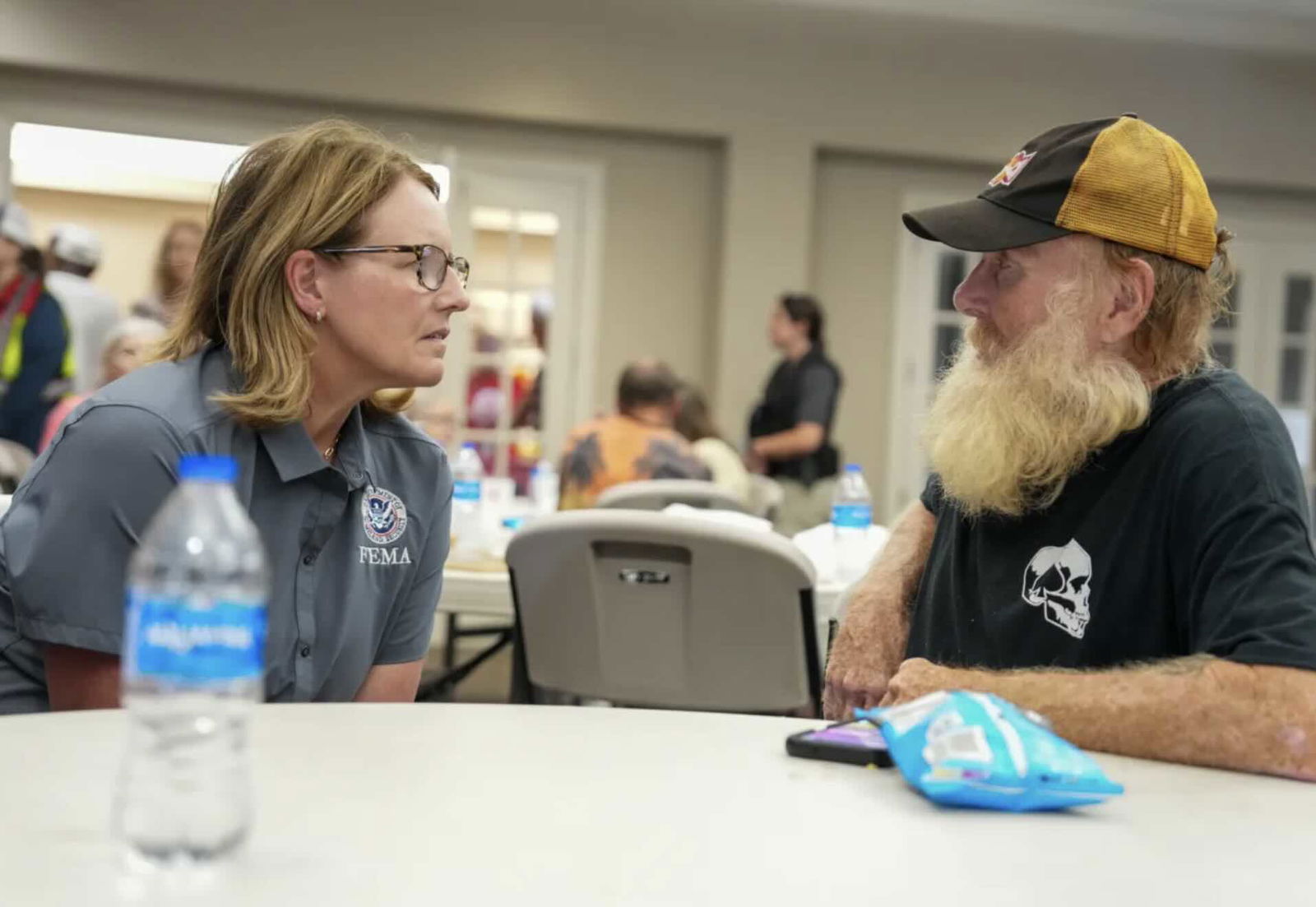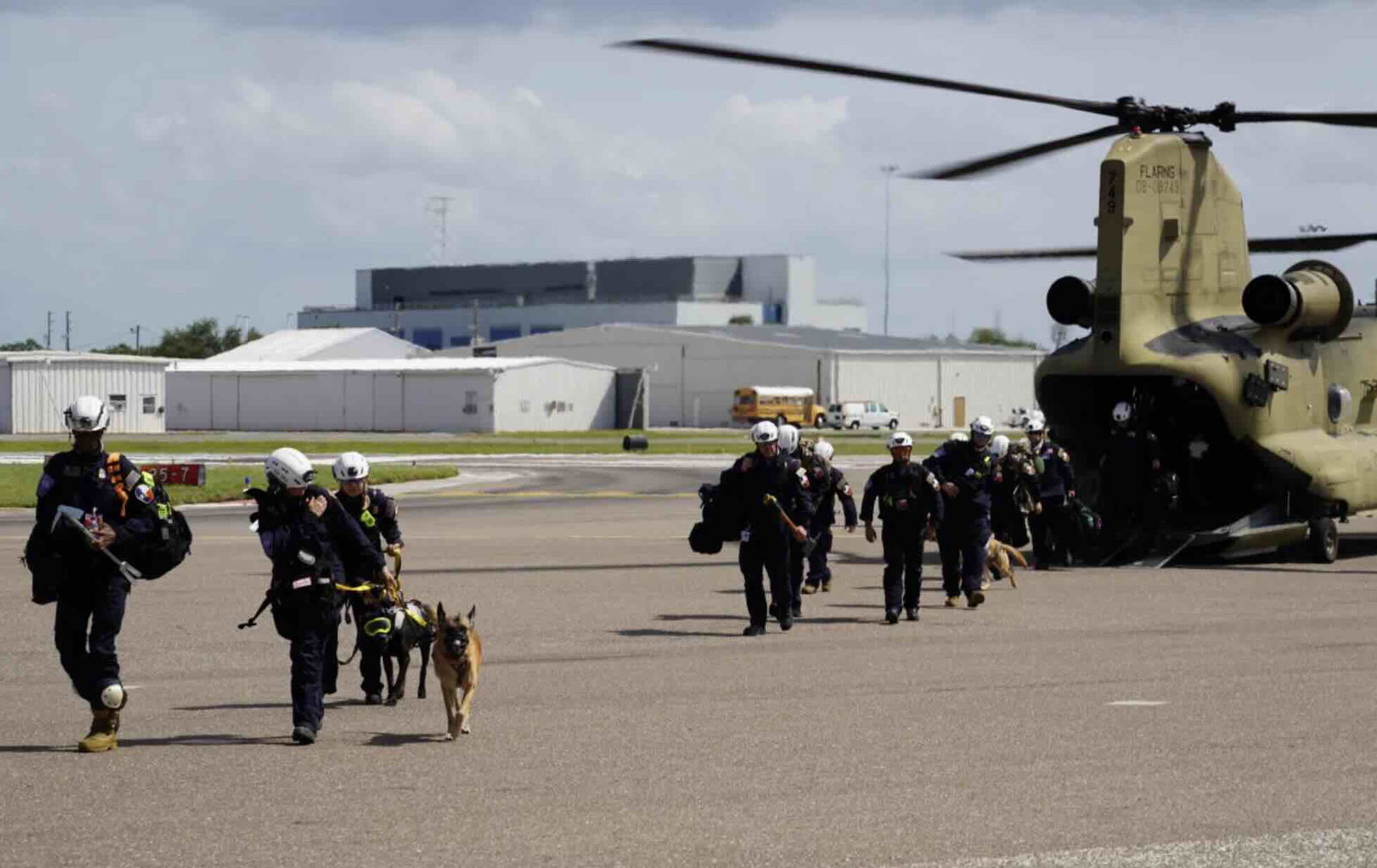

Welcome to this week’s installment of The Intelligence Brief… this week, following the devastation of Hurricane Helene and, just days later, Hurricane Milton making landfall in Florida, misinformation and conspiracy theories have spread widely, hampering recovery efforts. This week, we’ll be examining 1) false claims that are currently circulating, including rumors of secret land sales for lithium mining, allegations of disaster-relief funds being diverted, and unverified reports regarding current death tolls, 2) claims suggesting how federal authorities are covering up casualties or seizing land, and 3) what local authorities and officials from federal agencies like FEMA have said about the potential dangers of misinformation in undermining relief efforts.
Quote of the Week
“We are not going to let the misinformation be a distraction to the important work we need to do.”
– FEMA Administrator Deanne Criswell
The Latest From The Debrief
Latest News: In recent news from The Debrief, Hurricanes threatening the Southeast are now also hampering the search for alien life, and Tim McMillan offers his opinions on the recent alleged whistleblower claims involving the purported “Immaculate Constellation” UAP program allegations. You’ll find links to all our recent stories at the end of this week’s newsletter.
Podcasts: In podcasts this week, on The Micah Hanks Program, we provide recent updates on misinformation and conspiracies related to the impact of Hurricane Helene. Elsewhere, on the latest installment of The Debrief Weekly Report, Kenna and Stephanie veg out and discuss some vertical farming innovations, and how Germany wants to fuel its country one balcony at a time. You can find all our past episodes over on The Debrief’s Podcasts Page.
Video News: On the latest episode of Rebelliously Curious, Chrissy Newton is joined by Paul Thigpen, PhD, a renowned theologian with a PhD in Historical Theology from Emory University and the author of Extraterrestrial Intelligence and the Catholic Faith. Be sure to check out other great content from The Debrief on our official YouTube Channel.
But now, it’s time we shift our attention over to the misinformation and conspiracies that have been running rampant in the aftermath of the most severe inland storm to strike the U.S. since Hurricane Katrina nearly two decades ago.
Amid Relief Efforts Following Helene and Milton, Misinformation Abounds
In the aftermath of Hurricane Helene’s impact on the southeast, and with Hurricane Milton making landfall in Florida, a wave of misinformation has complicated recent recovery efforts.
In many of the most gravely impacted areas—including Asheville, North Carolina, where I am currently based—local officials, emergency responders, and community members have found themselves combatting not only the physical aftermath of the storm, but also a torrent of rumors and conspiracy theories that have been given life after receiving significant attention on social media websites.
Rumors Undermine Relief Efforts
Hurricane Helene, which made landfall as a Category 4 storm on September 26, left behind a path of destruction that claimed hundreds of lives and devastated communities across the Southeast. Last week in The Intelligence Brief, we highlighted the current situation in Asheville and the surrounding region, featuring original photography and firsthand accounts from many of those whose lives have been forever changed in the aftermath of the storm.


The response effort, led by the Federal Emergency Management Agency (FEMA) and local authorities, has faced significant challenges from false claims that began to appear online shortly after the storm devastated parts of North Carolina, Georgia, Tennessee, South Carolina, and portions of other surrounding states.
Among the most persistent rumors is the claim that the federal government is using disaster relief as a pretext to seize land in various parts of Western North Carolina. The otherwise quiet mountain community of Rutherfordton, N.C., became the focus of national headlines that included coverage featured in The New York Times over allegations that local officials were conspiring with U.S. federal government efforts to acquire land for purposes of lithium mining. According to proponents of the theory, local Rutherford County authorities convened at a recent meeting and discussed plans to bulldoze area land impacted by the storm for profit.
Bryan King, chairman of the Rutherford County commission, dismissed the misinformation outright, stating, “The only lithium for sale in Rutherford County is at the local Lowes stores in a 9-volt battery.”
Another widespread conspiracy theory alleges that communities throughout the region are being bulldozed to hide bodies left behind by the storm. Rutherford County Sheriff Aaron Ellenburg said he had “never seen anything like it,” expressing frustration over the baseless accusations.
“I’m sick and tired of this crap,” Ellenburg told the Times.
FEMA Targeted by Disinformation
The Federal Emergency Management Administration (FEMA) has also become a focal point for ongoing misinformation, with conspiracy theories suggesting that the agency is diverting disaster relief funds to Ukraine or using donations for purposes unrelated to relief efforts.
In recent days, The Debrief has received many questions from our readers about the claims (particularly given my current residence in Asheville, one of the most significantly impacted areas), including concerns expressed by some on account of the lack of apparent effort by FEMA and other U.S. government agencies to assist in the ongoing relief effort.
Fortunately, those of us here in the community are well aware of FEMA’s presence in the region.


“I have personally been to one of the FEMA distribution sites at Asheville Middle School,” said Christopher Heyes, a senior employee with Goodwill Industries in the Asheville area, during a recent appearance on my weekly podcast.
“I have received food, water, and laundry services from a FEMA distribution site in Asheville, personally,” Heyes said, expressing frustration with rumors spreading online that allege FEMA has been absent or performed inadequately in the region.
FEMA Administrator Deanne Criswell also recently addressed such allegations, calling them “just plain false” and emphasizing that rhetoric appearing online only creates “fear in our own employees” who are working tirelessly to support affected areas.
The agency has responded to these claims by providing regular updates on its website, including details of over $110 million in federal aid and the deployment of more than 1,200 search and rescue personnel in North Carolina. Despite these efforts, the damage caused by disinformation remains a challenge for those coordinating relief.
Calls for Unity from Local Leaders
Local leaders in Asheville and surrounding regions affected by the recent storm have also spoken out against the spread of false information, revealing a bipartisan effort among elected officials that stresses the need for unity during the recovery.
“Will you all help STOP this conspiracy theory junk that is floating all over Facebook and the internet about the floods in WNC,” wrote Kevin Corbin, a Republican state senator from North Carolina, who took to social media urging his followers to help stop the spread of conspiracy theories.
Similarly expressing frustration over the distraction misinformation and conspiracy theories present that detracts from critical relief efforts, Mayor Glenn Jacobs of Knox County, Tennessee, urged residents to “put aside the hate for a bit and pitch in to help.” Gov. Roy Cooper of North Carolina also recently highlighted the dangers of misinformation, calling it a “grave threat” that could be “deadly” in the critical days following the storm.
Residents like Damion Lineberger, a volunteer conducting wellness checks in Black Mountain, N.C., have also encountered the gap between online claims and reality. He described rumors of mass casualties as wildly exaggerated.
“Somebody puts something on social media and it turns 10,000 times worse,” Lineberger said.
The Path Forward
As the spread of misinformation has strained the resources and morale of those working to provide aid, recovery teams continue to work through treacherous conditions and logistical challenges present in Western North Carolina and surrounding states, with many officials express frustration that their efforts are being discredited online.


“It’s a challenging thing to read and see those social media posts,” said Aaron Aguirre, a Tennessee National Guard pilot who has helped deliver supplies to isolated areas.
“Everyone’s here because they want to be, not because they have to be,” Aguirre said.
Despite the setbacks, the resolve of those involved in the recovery remains strong. With additional federal support, including 500 more U.S. troops announced by President Biden, and ongoing efforts to correct the record, officials hope to bridge the gap between online rhetoric and the reality on the ground. For the communities impacted by Hurricane Helene, the focus remains on rebuilding—and finding ways to navigate the noise of the digital age.
As relief efforts continue, readers of The Intelligence Brief are asked to please consider donating to one or more of the following organizations that are aiding in the relief efforts for those affected by Hurricanes Helene and Milton:
- Caring for Others
- Feeding America
- BeLoved Asheville
- Global Empowerment Mission
- Ground Force Humanitarian Aid
- Mercy Chefs
- Loving Food
- Red Cross
- Goodwill Industries
That concludes this week’s installment of The Intelligence Brief. You can read past editions of our newsletter at our website, or if you found this installment online, don’t forget to subscribe and get future email editions from us here. Also, if you have a tip or other information you’d like to send along directly to me, you can email me at micah [@] thedebrief [dot] org, or Tweet at me @MicahHanks.


Here are the top stories we’re covering right now…
- Hurricanes Ravaging the U.S. Are Now Impacting NASA’s Search for Alien Life
Hurricanes threatening the Southeast are now also hampering the search for alien life with NASA’s ambitious Europa Clipper mission.
- Electric Propulsion Pioneer Morpheus Space Unveils Enhanced ‘JOURNEY’ Satellite Tracking Analytics Platform
Electric Propulsion pioneer Morpheus Space has unveiled its enhanced JOURNEY satellite mission tracking and analytics platform.
- This Company is Using De-Extinction Tools to Save Endangered Species
Deextinction company Colossal Biosciences has announced the establishment of the Colossal Foundation, a new nonprofit aimed at applying cutting-edge science.
- Meals on Heels This week on The Debrief Weekly Report…
On this week’s episode, Kenna and Stephanie run around the sea floor with a fish that has evolved to taste with its feet. They then veg out and discuss some vertical farming innovations, and how Germany wants to fuel its country one balcony at a time.
- Longstanding Evolutionary Mystery Resolved as Researchers Reveal “Anomaly” in Statistical Data
A long-held theory involving the quickened pace of evolution over short time frames could be explained by an “anomaly” revealed by researchers in a new study.
- Astronomers Have Made Another Odd Discovery That Challenges Theories on Galactic Formation
An unusual discovery in a remote Milky-Way-like galaxy is challenging our current theories on how galaxies are formed.
- Massive Radio “Bubble” Detected During Recent Observations of Distant Star-forming Galaxy
Astronomers have revealed the discovery of a massive radio bubble in the halo produced by a distant galaxy, according to findings.
- Was Mars Ever Home to Alien Life? NASA Unveils Groundbreaking Insights on How Mars Became Uninhabitable
NASA’s Curiosity rover reveals how Mars lost its water, providing insights into the planet’s extreme climate and potential for alien life.
- Lucid Dreaming Breakthrough: Startup Claims First-Ever Two-Way Dream Communication
REMspace, a California and Russia-based neurotech startup, claims to have achieved the first two-way communication between individuals during lucid dreaming.
- Solar-Powered Technology Turns Seawater into Fresh Water, Offering Hope for Global Water Crisis
A newly developed Canadian technology could help revolutionize access to clean water for over 4 billion people.
- This Tiny Tractor-Beam Laser Technology is Like Something Right Out of Star Trek
A new Star Trek-like tractor-beam technology is pushing optical tweezer technology ahead into the realm of science fiction.
- This New Model of the Universe is Making Astrophysicists Rethink our Entire Cosmology
“Basins of attraction” are the center of a new model of the universe, pushing forward our understanding of its vast structure.
- New Research Pioneers Remote Surveillance of Nuclear Energy Using Antineutrinos
Researchers have developed a new technique for remotely monitoring nuclear reactors using oscillations of antineutrinos.
- Hurricane Helene: Report from the Front Lines of a Disaster Zone
This week, we provide a detailed report on the situation on the ground in Asheville, North Carolina, in the aftermath of Hurricane Helene.
- Hurricane Helene: An On-the-Ground Report from a Devastated Region
In this special installment of The Intelligence Brief, The Debrief’s Editor in Chief Micah Hanks reports from Asheville, NC, on the impact of Hurricane Helene.
- Demonology Meets Science: Unraveling the Mysteries of Exorcism, Possession, and UAP Encounters
For part two of this series, UAP and Theology, Chrissy Newton delves into the intriguing intersections of demonology, exorcisms, and science, discussing how ancient theological concepts—especially concerning spiritual warfare—might overlap with modern scientific exploration and what this means for our understanding of both the spiritual and the extraterrestrial.
- Harvard Researchers Reveal ‘Treasure Trove’ of Data on Mysterious Voids in African Rainforest That Appear Out of Nowhere
Harvard scientists reveal a ‘treasure trove’ of new information about mysterious voids in the African rainforest that appear out of nowhere.
- New Study Reveals Surprising Potential for Life Around F-Type Stars, Expanding Hope For Habitable Exoplanets
New research suggests exoplanets orbiting F-Type stars are key star systems previously overlooked for their potential to support life.
- COVID-19 Impacted the Moon’s Climate, New Study Reveals
Researchers in India discover that COVID-19 lockdowns led to a cooler and frostier lunar climate, according to new study.
- Vertical Farming Can Help “Future-Proof” Food Production and Reduce Energy Usage Say Scientists
New study shows how improved vertical farming techniques that also use fewer resources can help future-proof worldwide food production.
- Germany Has Installed 550,000 Balcony Solar Panels. The United States Could Do it Too
Germany has outfitted over half a million balconies with solar panels to fight the climate crisis. Can the United States follow suit?
- “SOAR” LiDAR-UAV System Promises to Transform Military and Civilian Applications with Faster, Smarter 3D Aerial Reconnaissance
Researchers unveil a new multi-UAV system called SOAR, that promises faster and more accurate 3D reconstructions of complex environments.
